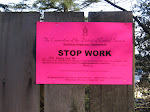Apple Pie in a Regional Context: a lesson for all
The Central Saanich Regional Context Statement explains how our Official Community Plan fits into the Regional Growth Strategy of the Capital Region. The current proposed wording says we would provide municipal services outside the urban containment areas for four reasons only: health, environment, agriculture and fire suppression. On the face of it, this sounds easy as apple pie.
But right now, not only is there no recipe for the pie, we don’t know if we have any of the ingredients. What should we be checking for?
First, we don't know the carrying capacity of our land and water table. How much 'growth' is okay? Or too much? How much do we preserve for future uses? What are the climate change predictions for this area, and their impact on our carrying capacity? What are regional water consumption trends, and their longer-term affect on us? Will the proposed services help or just delay the inevitable? For these questions alone, we need a full time environmental planner to carry out environmental impact studies – with regular followups to capture and measure any changes.
Second, we have no way to measure the true need for requested exemptions – other than what is in a submission. At the very minimum, effective guidelines should require every submission be accompanied by receipts or professional reports to demonstrate they have done everything reasonable to mitigate the problem prior to requesting municipal services – and, as a matter of public interest, available at the municipal hall. The municipality should be putting together a list of expectations--acceptable proofs and acceptable third party verifiers--for those wishing services to follow. Among the expectations would be robust covenants that prevent a provision of service from becoming a ‘thin edge of the wedge’, leading to unsustainable development that further drains our resources.
Third, we need clear and unequivocal information about the impacts (health, fiscal, effectiveness of services) of proposed extension of services, and alternatives to the proposed service extension.
Fourth, guidelines embedded in the OCP. We all appreciate that using guidelines based on policies of the council would save time (and public hearings). But council policies, no matter how good, can be easily overturned by the next council. Poor foundations for the certainty needed by both citizens and developers. Rather like dicing a few crab apples into the bowl.
Given what’s riding on their decisions, we really need the cooks to overcome any temptation to improvise.
Our new OCP falls short because of vague concerns about being ‘too prescriptive.’ However, prescriptions have a role in maintaining our health and wellbeing – and may be necessary to establish the clear and constant guidelines so essential to preserving our ‘green and pleasant land’.
This isn’t about denying people clean and healthy water. This isn't about denying someone a piece of the pie. It is about making sure the tree that provides the apples is there for the next generation.
Wednesday, September 10, 2008
Subscribe to:
Post Comments (Atom)




















No comments:
Post a Comment